The original post can be found further down.
Update #9: 7th August 2020
I have today sent a further email to Sure Falkland Islands.
To: Chief Executive, Sure South Atlantic
Subject: OTT service provider oriented Internet Access product
Dear Sir
I sent an email on June 30th 2020, which is now over one month ago, concerning the availability of a suitable Internet Access product for use by local businesses to provide an Over-the-Top Internet service.
This email requested an acknowledgement of its receipt and a date when Sure will be able to provide an answer which was originally promised in April 2020 but put on hold due to Covid-19.
Sure have not acknowledged or provided a date, sadly, effectively ignoring my request.
I am sure that times have been challenging and that Sure has staffing issues, but there should be no justifiable reason for such a lack of response for such an important issue.
I would again politely request a responce to this request
I look forward to hearing from you.
Thank you
Chris Gare
OpenFalklands
Update #8: 30th June 2020
I have today emailed Sure South Atlantic to resurrect my request.
To: Chief Executive, Sure South Atlantic
Dear Justin,
I hope things have gone reasonably smoothly for Sure and your employees during the Covid crisis and there were not too many challenges the company could not manage.
As we seem to be over the worst of it, I believe the time is right to restart the dialogue concerning the availability of an Over-top-Top Internet Access services that would enable other Falkland Island businesses to launch other local Internet services.
I saw the press release in regard to the miPlayer initiative on Friday and I’m pleased that this has finally been released as it is good news for the islands.
Indeed, I have been led to understand that there are several other businesses who are considering just this possibly so the time is right.
On the 5th March a commitment was made to respond by Monday 9th April with a statement about Sure’s position in this matter, but I put this on hold until things settled down somewhat.
I would now ask acknowledgment of this email and a new date by which Sure will be able to respond. I would assume this shouldn’t take too long as I guess your response was agreed back in April.
Thank you, and I look forward to hearing from you.
Kind Regards
Chris Gare
Update #7: 1st April 2020
I’ve had no reply to this email so far, but that is OK in the circumstances. I will assume my proposal is accepted in these difficult times.
To: Chief Executive, Sure South Atlantic
Bearing in mind the current short-term challenges for all of us brought about by the Coronavirus, I think it would be best that I defer my OTT service request and discussion until things have settled down a bit.
I’ll take it up again when things have settled down a bit.
Of course, if you still want to reply by the date given, then that is OK by me.
Please let me know your thoughts.
Kind regards
Chris
Update #6: 5th March 2020
I can confirm receipt of your email and will provide a response by close of business Monday 9th April.
Regards
Chief Executive, Falkland Islands
Update #5: 4th March 2020
2nd open letter to Sure South Atlantic:
To: Chief Executive, Sure South Atlantic
Dear Sir
On 18th February 2020, I sent an open email concerning local Over-The-Top Internet services where I asked that its receipt be acknowledged by Sure South Atlantic. As far as I’m aware, I have not received such an acknowledgement.
As I suspect that this maybe a simple oversight, I would again please request that its receipt is acknowledged.
Kind Regards
Chris Gare
OpenFalklands
Update #4: 19th February 2020
An open letter to Sure South Atlantic concerning local OTT services on the Falkland Islands.
To: Chief Executive, Sure South Atlantic
Dear Sir
This open email on OpenFalklands is about the provision and hosting of local Over-The-Top (OTT) Internet services in the Falkland Islands. There are no legal or exclusivity hindrances as there is an exemption for OTT services in Sure South Atlantic’s Individual Operating Licence. This is as it should be from the perspective of Internet ethics and the ambitions of its founders.
However, there is a significant commercial hindrance that is in the bailiwick of Sure South Atlantic that needs to be addressed. This issue is about the current implementation of ‘Inclusive MB’ usage quota policy that is applied to all Sure’s broadband Internet access packages. There are no legal requirements put on Sure South Atlantic to implement a usage quota regime. This means that the implementation of quota policies is exclusively under the control of Sure South Atlantic.
A daytime quota-based regime has a decisive role in that it provides a mechanism to achieve the following requirements amongst others.:
- As a commercial policy to enable the creation of a hierarchy of Broadband Internet access packages that meet the affordability and usage requirements of Sure’s customer base.
- As a technical policy to minimise the possibility of congestion on the satellite segment at times of peak usage.
Usage quotas are applied to all IP traffic, whether packets remain on the island or go off-island via the satellite. This blanket application of quotas, although meeting the needs of islands from a historical perspective has the unintended consequence of preventing the creation and hosting of local OTT Internet services that have sprung up in all other countries in the last two decades.
A local OTT service provider business is only able, as far as I’m aware, to purchase one of the existing retail quota-based broadband packages. None of these has a sufficient quota to cope with the aggregate total of their customers’ traffic. In practice, no local OTT service provider can practically run a business based on a retail-focused usage quota. This is especially so for media streaming services, but affects any service, should they be taken up en-mass by islanders who understand the convenience and performance hike made available by “local services” not needing to be hit by the satellite performance issues.
Of course, if a Falkland Islands based OTT service provider wants to offer services to off-island customers or subscribers, then quotas are necessary. However, if their customer base is exclusively limited to the Falkland Islands, then the provision of a fit-for-purpose, affordable, quota-free (or higher-quota) OTT Service Provider Interconnect Package is not only possible but could be considered mandatory in this day and age.
Falkland Islands’ based consumers or businesses, should be able to access these local OTT service providers without the ensuing IP traffic counting towards their quota or introducing an increased local-traffic based quota. This has been demonstrably shown to be technically and commercially deliverable with the current FIG/BFBS/Sure MiPlayer streaming service trial so it should be made available to other local OTT service providers.
Sure South Atlantic is privileged to have been provided with an exclusive licence in the Falkland Islands for the provision of telecommunications carriage services. Therefore its commercial and technical policies should not disincentivise the creation of local OTT services as this could be considered as an anti-competitive practice and not in the interests of Falkland Islands’ business and consumer communities.
I would request that Sure South Atlantic / Sure International undertake an in-depth consider this issue and task its Product Marketing department to develop an OTT Service Provider Interconnect Package that is fit-for-purpose that enables the development of a vibrant set of local Falkland Islands Internet services. This is a standard product available in every other country in the world.
I am sure that Sure South Atlantic / Sure International’s management teams will respond to this open email in a positive, supportive and enthusiastic manner with a public statement of its views and how they will address this need. This statement will be published on OpenFalklands.
I would appreciate that the receipt of this email is acknowledged.
Kind Regards
OpenFalklands
Update #7: 23rd March 2020
I’ve had no reply to this email so far, but that is OK in the circumstances. I will assume my proposal is accepted in these difficult times.
To: Chief Executive, Sure South Atlantic
Bearing in mind the current short-term challenges for all of us brought about by the Coronavirus, I think it would be best that I defer my OTT service request and discussion until things have settled down a bit.
I’ll take it up again when things have settled down a bit.
Of course, if you still want to reply by the date given, then that is OK by me.
Please let me know your thoughts.
Kind regards
Chris
Update #6: 5th March 2020
I can confirm receipt of your email and will provide a response by close of business Monday 9th April.
Regards
Chief Executive, Falkland Islands
Update #5: 4th March 2020
2nd open letter to Sure South Atlantic:
To: Chief Executive, Sure South Atlantic
Dear Sir
On 18th February 2020, I sent an open email concerning local Over-The-Top Internet services where I asked that its receipt be acknowledged by Sure South Atlantic. As far as I’m aware, I have not received such an acknowledgement.
As I suspect that this maybe a simple oversight, I would again please request that its receipt is acknowledged.
Kind Regards
Chris Gare
OpenFalklands
Update #4: 19th February 2020
An open letter to Sure South Atlantic concerning local OTT services on the Falkland Islands.
To: Chief Executive, Sure South Atlantic
Dear Sir
This open email on OpenFalklands is about the provision and hosting of local Over-The-Top (OTT) Internet services in the Falkland Islands. There are no legal or exclusivity hindrances as there is an exemption for OTT services in Sure South Atlantic’s Individual Operating Licence. This is as it should be from the perspective of Internet ethics and the ambitions of its founders.
However, there is a significant commercial hindrance that is in the bailiwick of Sure South Atlantic that needs to be addressed. This issue is about the current implementation of ‘Inclusive MB’ usage quota policy that is applied to all Sure’s broadband Internet access packages. There are no legal requirements put on Sure South Atlantic to implement a usage quota regime. This means that the implementation of quota policies is exclusively under the control of Sure South Atlantic.
A daytime quota-based regime has a decisive role in that it provides a mechanism to achieve the following requirements amongst others.:
- As a commercial policy to enable the creation of a hierarchy of Broadband Internet access packages that meet the affordability and usage requirements of Sure’s customer base.
- As a technical policy to minimise the possibility of congestion on the satellite segment at times of peak usage.
Usage quotas are applied to all IP traffic, whether packets remain on the island or go off-island via the satellite. This blanket application of quotas, although meeting the needs of islands from a historical perspective has the unintended consequence of preventing the creation and hosting of local OTT Internet services that have sprung up in all other countries in the last two decades.
A local OTT service provider business is only able, as far as I’m aware, to purchase one of the existing retail quota-based broadband packages. None of these has a sufficient quota to cope with the aggregate total of their customers’ traffic. In practice, no local OTT service provider can practically run a business based on a retail-focused usage quota. This is especially so for media streaming services, but affects any service, should they be taken up en-mass by islanders who understand the convenience and performance hike made available by “local services” not needing to be hit by the satellite performance issues.
Of course, if a Falkland Islands based OTT service provider wants to offer services to off-island customers or subscribers, then quotas are necessary. However, if their customer base is exclusively limited to the Falkland Islands, then the provision of a fit-for-purpose, affordable, quota-free (or higher-quota) OTT Service Provider Interconnect Package is not only possible but could be considered mandatory in this day and age.
Falkland Islands’ based consumers or businesses, should be able to access these local OTT service providers without the ensuing IP traffic counting towards their quota or introducing an increased local-traffic based quota. This has been demonstrably shown to be technically and commercially deliverable with the current FIG/BFBS/Sure MiPlayer streaming service trial so it should be made available to other local OTT service providers.
Sure South Atlantic is privileged to have been provided with an exclusive licence in the Falkland Islands for the provision of telecommunications carriage services. Therefore its commercial and technical policies should not disincentivise the creation of local OTT services as this could be considered as an anti-competitive practice and not in the interests of Falkland Islands’ business and consumer communities.
I would request that Sure South Atlantic / Sure International undertake an in-depth consider this issue and task its Product Marketing department to develop an OTT Service Provider Interconnect Package that is fit-for-purpose that enables the development of a vibrant set of local Falkland Islands Internet services. This is a standard product available in every other country in the world.
I am sure that Sure South Atlantic / Sure International’s management teams will respond to this open email in a positive, supportive and enthusiastic manner with a public statement of its views and how they will address this need. This statement will be published on OpenFalklands.
I would appreciate that the receipt of this email is acknowledged.
Kind Regards
OpenFalklands
Update #3: 14th February 2020:
Reply to the Falkland Islands Attorney General:
Dear Sir
I very much appreciate your quick response.
I fully understand and respect your position in relation to you not providing legal advice to individuals and fully endorse your recommendation about the need for businesses to take independent legal advice as this would represent best business practice.
Thank you also, for your clarity in relation to the question in hand and take succour from the stated view (which I recognise does not represent advice or opinion) about the lack of prohibition and lack of necessity for a licence to deliver such services. There has been considerable confusion about this issue to date, as I identified in my discussions with individuals with an interest in such services on the islands.
Again, thank you for your prompt reply at this time.
Kind regards
OpenFalklands
Update #2: 13th February 2020:
Response from the Falkland Islands Attorney General:
Thank you for your message. As you will be aware, as Attorney General for the Falkland Islands, I have a number of functions. A key function is to provide legal advice to the Falkland Islands Government. I am not able to provide legal advice to private individuals, such as yourself. It would be wrong for me to do so.
I read the post on your website, but it is still not clear to me precisely what you envisage a “local over the top service” would likely consist in or how you envisage this would be delivered from the service provider to end users. As I understand it, “over the top” services include media services such as those provided by Netflix, iTunes, Google Play Movies & TV, and Amazon Prime Video, and communication services such as WhatsApp, Telegram, and Skype, as well as, no doubt, many other varied services. Without straying into giving any legal analysis or opinion, it is obvious that over the top services such as those I have mentioned, are not prohibited by the exclusive licence held by Sure. Nor do the operators of such services require any licence from the Falkland Islands Government or Communications Regulator to do so (Editor: my highlight).
Anyone wishing to operate a local over the top service (whatever that means), would need to satisfy themselves that their proposed service would be lawful. Services can differ substantially in what they provide and how they do this. The question of what licence might or might not be required, or what might or might not be within the scope of the exclusive licence currently in place is likely to be very fact-specific. I would recommend that anyone seeking to explore provision of a service in the Falkland Islands seek their own advice, including independent legal advice.
Yours sincerely
Attorney General
Update #1: 12th February 2020:
Letter to the Falkland Islands Attorney General:
I have sent an email to the Falkland Islands Attorney General requesting him to confirm that the interpretation of exclusive Sure South Atlantic Limited’s Individual Operating Licence in relation to local OTT service is correct or otherwise.
Subject: In relation to local Over-The-Top (OTT) Internet services
Dear Sir
I am writing this email as a follow up to a post on OpenFalklands.com on January 23rd 2020 entitled “Local Over-The-Top Internet services and the ‘exclusive licence’. This post was focused on whether local businesses or entrepreneurs who offered local Falkland Island Over-The-Top (OTT) Internet services contravened the exclusivity terms as defined in the Sure South Atlantic Limited’s Individual Operating Licence. These local OTT services would be provided on a Free-Of-Charge (FOC) or standard subscription basis.
The definition and conditions of the Exclusivity provided were clearly outlined in Clause 6 of the Licence and further detailed in other clauses. However, these clauses, to my mind, are overruled in relation to OTT services by the explicit and clear definitions of “Fixed Services” and “Over-The-Top Services” as defined in section 1.1, “Definitions and Interpretation”. These definitions state:
- “Over The Top Services” means a service delivered across an IP (internet protocol) network or any other data network”
- “Fixed Service” means a communications access service provided at a fixed location and which includes fixed-line telephony access services and fixed-line internet access services, but for the avoidance of doubt excludes Mobile Services and Over The Top Services, delivered over those access services;
These definitions, in my opinion, and other advice I’ve sought, provide a clear basis for local service providers to offer OTT Internet services and apps in the Falkland islands without legal hindrance from the Falkland Islands Government or the holder of the Licence, Sure South Atlantic Ltd. Of course, the running of local OTT services would require the purchase of an appropriate commercial Agreement from Sure South Atlantic for the use of their local IP network. And, for the present, the OTT service providers’ IP traffic would count towards their monthly quota, limiting the scale and scope of provided services.
I would formally request that the Falklands Islands Attorney General confirm that this interpretation of the clauses in the Individual Operating Licence written by FIG’s lawyers at the time, Preiskel & Co LLP, is correct, or otherwise provide reasoning as to why this view could be considered incorrect.
As this issue is of such importance and interest to businesses and entrepreneurs on the islands, I am sending this email to the Attorney General in an open manner by including it on the OpenFalklands post referred to above. I will post the response on OpenFalklands when it is received as I did with .FK ccTLD issue last year.
I would appreciate that your office acknowledge the receipt of this email and I look forward to reading your response in due course following the necessary consultations.
Kind Regards
Chris Gare
OpenFalklands.com
The original post.
Local Over-The-Top (OTT) Internet services and the ‘exclusive’ licence
I am no lawyer, and I have no wish to be. Still, I have spent some time recently looking at all the published Falkland Islands Government (FIG) papers concerning the Communications Ordnance and the exclusive Individual Operating Licence signed by Sure South Atlantic and FIG in 2017. This late-night reading may have sent me to sleep once or twice!
I wanted to understand what the word ‘Exclusive’ meant in relation to the provision of Over-The-Top Internet services created by local entrepreneurs or businesses. Oh, and I’ll try and not send you to sleep!
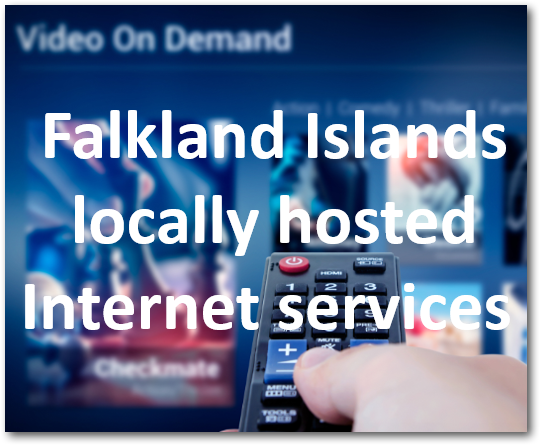
Let’s start with some definitions relating to the subject discussed.
Exclusive licence: An exclusive license is one where the licensor agrees not to grant other licences that have the same rights in that region.
Over-The-Top services (OTT): An OTT service is ANY service or application (App) that is supplied over the Internet or an ISP Internet access network. These could include information provision, media streaming, web sites, directories, email, messaging, chat, media streaming, peer-to-peer service, data backups, video conferencing, location services, tracking services, financial, gaming – anything really!
Internet Access Service: An Internet Access service is a service sold by Internet Service Providers to enable their customers to access the global Internet. The service can be provided over a fixed terrestrial network or a mobile network.
Fair-use policy: Fair use policy is a policy put in place by a provider of broadband Internet services to limit the speeds at any particular time to ensure that all users are provided with service no matter how slow it will be.
Anti-competitive practice: The UK Government identifies most anti-competitive business activity as being under one of two categories. Price fixing, bid-rigging or any other ways of agreeing not to compete or abuse of a dominant market position.
My November 2019 presentation in Stanley
Let’s start with two slides from my public presentation In November 2019:
The two main points of this slide were that there should be many local Internet services as found in any other country and that a monopoly ISP should not prevent 3rd parties launching local Internet services. These are called. Over-The-Top (OTT) services.
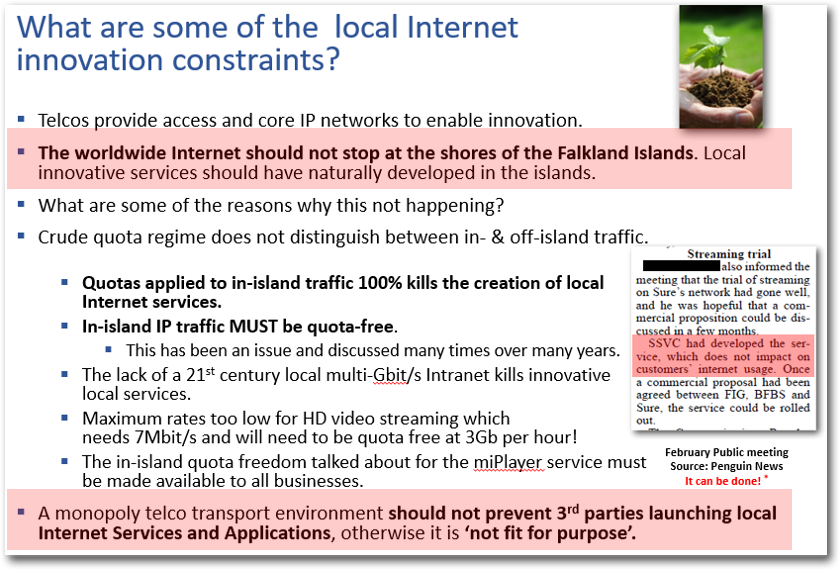
The next slide showed what I thought to be the legitimate boundaries of an exclusive licence. Exclusivity should apply to transport networks (terrestrial and 4G) but NOT to local OTT Internet applications and services.
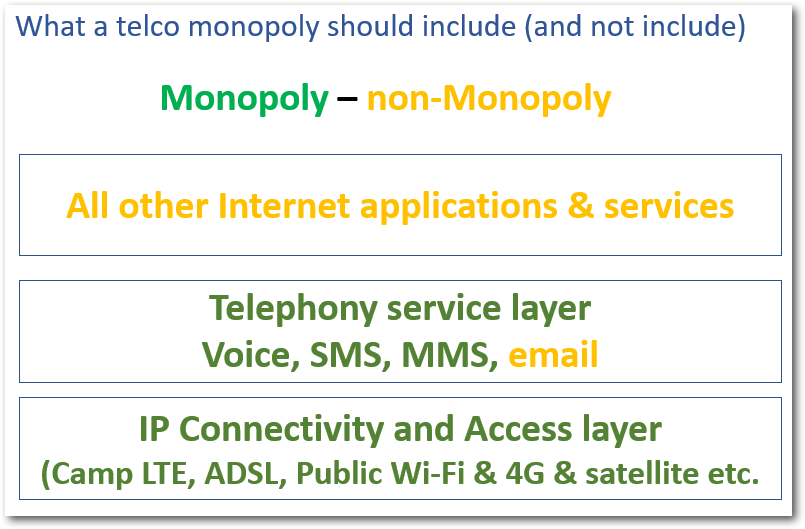
At this time, I had not studied whether my views conflicted with Falkland Islands legislation. It is now time to look into this to understand whether my beliefs were wishful thinking or not.
Now let’s take a quick look at what the Communications Ordinance states concerning an exclusive licence:
The grant of an exclusive licence
The possibility of granting an exclusive communications licence was enabled in Clause 62 of the Communications Ordinance 2017, published on December 5th 2019:
“62. Grant of exclusive licence
(1) The Governor may grant an exclusive licence to a telecommunications operator (“the exclusive licensee”) to –
(a) operate an electronic communications network in the Falkland Islands,
(b) provide electronic communications services in the Falkland Islands, and…”
The definition of “electronic communications network” provided in the Ordinance is:
“(a) a transmission system for the conveyance, by the use of electrical, magnetic or electromagnetic energy, of signals of any description.”
Under this broad-definition and catch-all language so much loved by lawyers, this definition would include an IP-based Internet Access Service and an IP-based transmission network. Indeed, that is what would be expected in an exclusive conveyancing licence!
Now let’s look at the Sure South Atlantic exclusive licence.
The history of the exclusive Individual Operating Licence
Sure South Atlantic’s exclusive Individual Operating Licence was approved by Members of the Legislative Assembly (MLAs) on the 15 March 2017 in the EXCO paper titled 42-17P: Telecommunications Individual Operating Licence – Final. Clause 3.1. stated:

Two versions of the Individual Operating Licence are to be found on Falkland Islands Government’s(FIG) web site. a draft version can be found using the search option on the EXCO paper download page – Draft Falkland Islands Individual Operating Licence. The final version of the licence can be found on the FIG web site here.
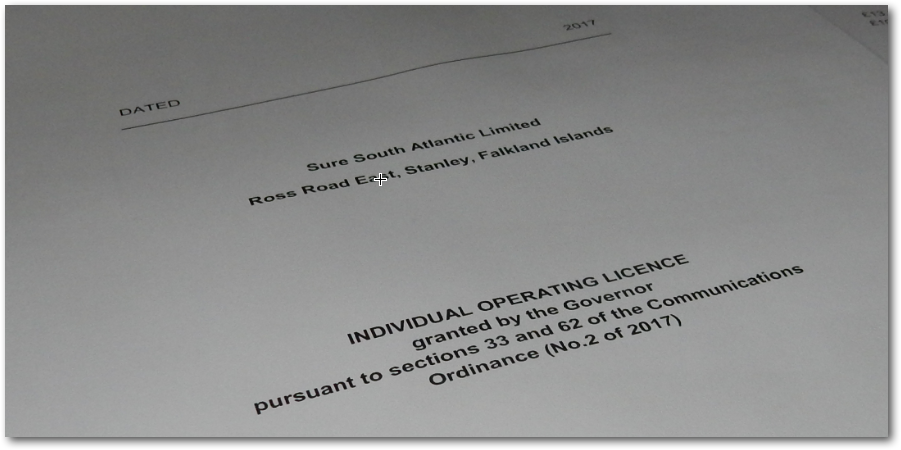
Clause 6 in the Licence states that Sure South Atlantic has exclusivity of “Fixed Services” which is relevant to the subject of this post.

It should be noted that Sure South Atlantic’s Internet Access service is accessible using the terrestrial fixed ADSL network AND the recently deployed 4G mobile network.
However, there ARE exclusions to this exclusivity as there should be, but concerning this post, the most relevant is (e).
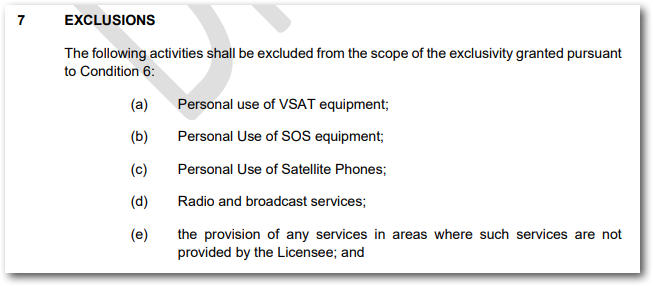
On a quick read, (e) could be interpreted as meaning that if there was a service that Sure South Atlantic did not supply, and it came to their attention, they could immediately offer it and henceforth it would become an exclusive service. This seemed to be the interpretation taken by several informed individuals on my trip to the islands in November 2019. Although this certainly would be the case for any new IP transport service, we need to ask whether it would apply to local Over-The-Top Internet services carried over Sure South Atlantic’s fixed and mobile IP networks?
In section 1.1 of the licence DEFINITIONS AND INTERPRETATION, Over-The-Top services are defined as would be expected:

The term Fixed Service is also defined in the licence:

(Sorry, for the animation but I could not resist it!)
Yes, the final version of the licence clearly states that “Over-The-Top Services” delivered over Sure South Atlantic’s “Internet access services” are expressly excluded from the Exclusivity clause of the exclusive licence.
A further emphasis of this OTT exclusion is made by the use of the classic legal phrase “for the avoidance of doubt”.
The term “delivered over those access services” means that this applies to both Sure South Atlantic’s fixed and 4G mobile networks.
So, there we are, in my non-lawyer opinion, nothing is stopping local entrepreneurs or businesses from hosting and running local Over-The-Top services in the Falkland Islands from the perspective of potentially breaking the exclusivity of Sure South Atlantic’s licence.
There is silence as to whether a local OTT service created for end-users could be offered as a commercial basis, so this is not an issue. Moreover, not all OTT services gobble up quotas like media streaming; some attractive services can be created in spite of quotas being applied to in-island IP traffic.
Well, all is hunky-dory except for that issue of usage quotas.
Back to the old issue of quotas
Let’s go over this again.
In-island traffic quota regime: As I’ve written about time and time again on OpenFalklands, the use of a monthly download quota is purely for a focussed technical reason. To reiterate; it is there to prevent the overload of the islands’ satellite capacity,
It is purely a commercial solution implemented by Sure to deliver a Fair Use Policy and fair sharing of satellite capacity to reduce congestion. ‘Fair Use’ is referred to in Clause 48 of the Individual Operating Licence but only when talking about the “Nighttime window” and agreeing “Optimisation” of the policy with the Regulator.
The use of a Quota policy on IP traffic that originates and terminates in the Falkland Islands without transiting the satellite is not a defensible stance to take.
Of course, the prime objection that would be (has been?) raised by Sure South Atlantic would be that the ‘local Internet access network” would not support the increased level of traffic that would be created by ‘freeing up’ the development of local Internet services. And, also by claiming that it is “not technically possible”. This is not a sustainable stance to take when considering the importance of local Internet services to the islands’ economy in the long term.
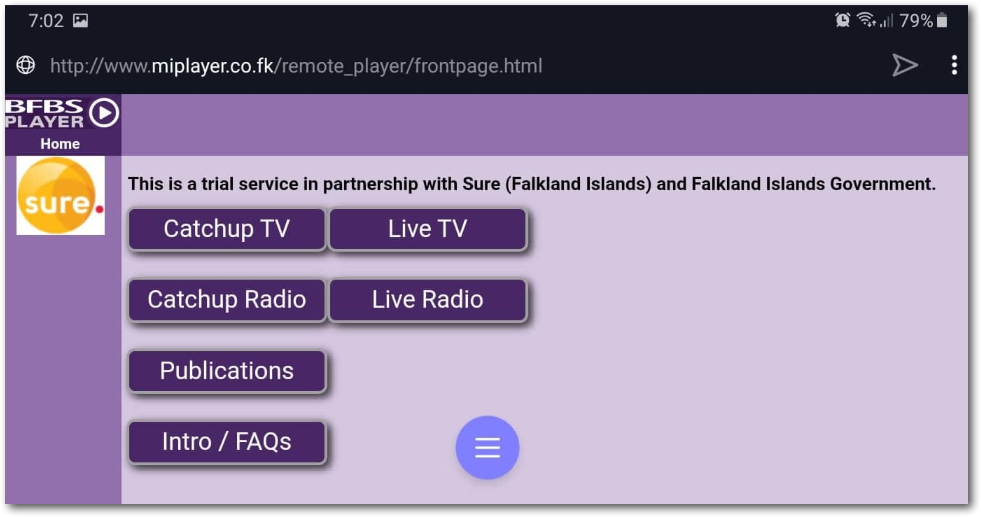
However, in respect of the joint FIG/BFBS/Sure trial of low-resolution video streaming, www.miplayer.co.fk, it has been stated twice in Penguin News that its use will not be included in users’ quotas.
This ‘exclusion-from-quotas’ policy being applied to the miplayer.co.uk consortium ‘trial’ must be made available to other potential Internet entrepreneurs and businesses in the Falkland Islands who wish to offer local OTT services. It could be considered by some, that not to do so would represent a case of anti-competitive practice.
Quota double whammy
There is no recognition in quota policy of local inter-/intra- IP account traffic, thus creating a quota anomaly, i.e. a possible OTT service provider and its customers’ quotas are both hit. Or, if IP traffic transits between two locations using the same Internet account, then its owner’s quota is hit for both sent and received ends – a double whammy. None of this local OTT traffic is transiting the satellite!
IP access prices for local OTT providers: Access to Sure South Atlantic’s IP network needs to be offered to local OTT service providers at reasonable prices. Excessive business IP access prices would be as much as a disincentive to the creation of local OTT services as experienced with VSAT service prices.
Roundup
I hope this research helps remove an obstacle to enabling Falkland islands’ nascent digital entrepreneurs or businesses to launch local OTT services. There is much more to do of course, but if local businesses and entrepreneurs do not demand the removal of the remaining obstacles, then little progress will be made.
It’s rather strange to find a country, albeit a small one, with a whole industry sector effectively absent due to unconsidered and unaddressed issues. I do hope these OTT issues will be considered and addressed in the National Broadband Strategy going forward.
Caveat: If this interpretation of the exclusive licence is considered to be inaccurate, or there are redacted clauses that override this definition of Fixed Services, then I will be happy to publish an update.
Copyright: January 2020, OpenFalklands

This is one of the wonderful articles that I have read regarding internet services and the exclusive license. Sharing your blog will helps me a lot in my research.
I’m delighted that the conversation seems to have been able to move on from the banalities of “well, I don’t know how you’d do it”, or “it’s technically impossible”, to the super new “YOU better satisfy YOURSELF that it’s legal”. I ‘have’ and I ‘did’… Years ago.
The interesting thing with THAT particular hurdle is that it has now become the ‘chant’ from Sure themselves – “… we couldn’t possibly allow you to operate a system that makes it easier to pirate software and movies and mumble mumble mumble…”. I’m just trying to get that one in writing.
There are two things about that notion that are curious – firstly, does Sure really believe that their customers (3000 close family and friends) are really all nothing more than a bunch of crooks ?
Also, I wonder what the governments position on that hurdle actually is – for example, does that test also apply to Sure, themselves ?
I don’t know if any of the objections (reproduced below) to removing quotas have actually been raised, but let me assure you that they are all pure bullshit.
The access speeds used in the Falklands are not merely previous generation, they are at least three or four generations out of date. It would be a trivial and low cost exercise to upgrade any congested backhauls to support line rate speeds across the board. In fact a single Ethernet interface could carry the whole nations traffic at once even if every man, child and woman would be online and downloading at full speed.
It would also be trivial to upgrade the access network at least two generations, if not three, while you are at it.
“Not technically possible” in this context is an euphemism for either “I don’t know how to” or “I think it’s more profitable for me to milk this cow as is”. Neither should be tolerated.
Relevant quote from article:
“Of course, the prime objection that would be (has been?) raised by Sure South Atlantic would be that the ‘local Internet access network” would not support the increased level of traffic that would be created by ‘freeing up’ the development of local Internet services. And, also by claiming that it is “not technically possible”.”
This is so spot on! It is so obvious that local quotas should be abolished and anti-competitive practices should be forbidden.
I’m also having a hard time convincing myself that Sure’s monopoly shouldn’t be terminated with immediate effect.